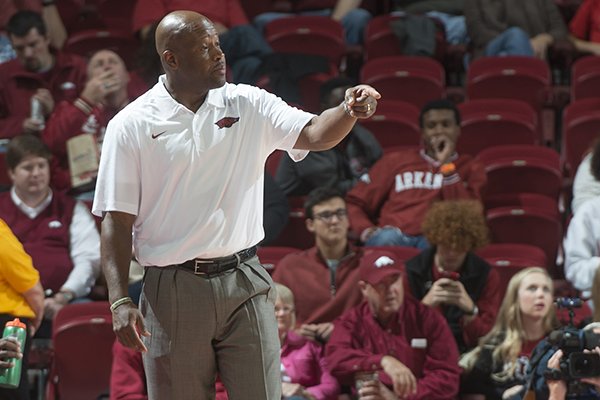FAYETTEVILLE -- If Arkansas Coach Mike Anderson had his way, men's college basketball would have the shortest shot clock in the world.
The NBA has used a 24-second shot clock since 1954. International rules reduced the shot clock from 30 to 24 seconds in 2000.
Tonight’s game
ARKANSAS VS. PITTSBURG (KAN.) STATE
WHAT Men’s exhibition game
WHEN 7 p.m.
WHERE Walton Arena, Fayetteville
Women's college basketball teams have been using a 30-second shot clock since the sport's inception in the early 1970s. The WNBA went from a 30-second shot clock to 24 seconds in 2006.
Men's college basketball has remained in the slow lane by comparison, using a 35-second shot clock since 1993. The men didn't have a shot clock at all until implementing a 45-second one in 1985.
So how short of a shot clock would Anderson -- whose slogan since becoming a head coach 13 years ago has been "The Fastest 40 Minutes in Basketball" -- like to see?
"A 20-second shot clock," Anderson said. "How about that?"
That may not be realistic, but the men's college game is showing signings of moving at a faster pace.
During exhibition games this season -- including Arkansas' matchup against Pittsburg (Kan.) State at 7 tonight in Walton Arena -- teams from the SEC, Atlantic Coast Conference and Atlantic-10 Conference are playing with an experimental 30-second shot clock.
The conferences agreed to use the shorter clock to help provide data for the NCAA to consider in making a possible clock adjustment.
"It's something that probably is going to come down the pike when you think about it," Anderson said. "I'm sure it's going to get closer to the NBA game with the speed of the game, the excitement of the game."
Arkansas played with the 30-second shot clock in its Red-White intrasquad game -- which had a 99-98 final --and in a 110-74 victory over Central Oklahoma in the Razorbacks' exhibition opener.
The Razorbacks, who had one shot-clock violation in the Red-White game and none against Central Oklahoma, said they didn't notice the difference in using a 30-second shot clock because of the team's uptempo style.
"It would be different, something to look into just to have a faster game," Arkansas junior guard Anthlon Bell said. "People want to see entertainment, so I'm guessing that's what the NCAA wants to see -- a 30-second shot clock and people shooting the ball more and getting more offensive production."
Several ACC coaches said they're in favor of the NCAA going to a 30-second shot clock.
"It's almost embarrassing that we can have our female counterparts play with a 30-second shot clock and we're not," Louisville Coach Rick Pitino said at ACC media days. "It's more exciting for the fans, for television, to play fast."
"That's where the game is headed," Pittsburg Coach Jamie Dixon said. "We want to be ahead of the game."
Wake Forest Coach Danny Manning will bring his Demon Deacons into Walton Arena to play Arkansas on Wednesday night.
"If the women can do it, why can't the men?" Manning said of switching to a 30-second shot clock.
"It'll create more possessions, maybe create an even more exciting game," Miami Coach Jim Larranaga said. "I think it's long overdue."
Jimmy Dykes, Arkansas' new women's coach, is now working with a 30-second shot clock after calling men's games for ESPN for several years as an analyst and previously being an assistant coach for men's teams.
Shortening the men's shot clock by five seconds, Dykes said, could have an impact.
"You'll see some rushed shots that you wouldn't see if you had five more seconds to go," Dykes said. "Kids will start feeling the pressure of the shot clock when it gets below five, and that's going to come five seconds quicker."
What if the men eventually go to a 30-second shot clock?
"I don't think it's going to change the game dramatically," Dykes said. "Kids adapt, coaches adapt."
It doesn't figure to be much of an adjustment for Anderson and the Razorbacks.
Arkansas junior guard Jabril Durham said he didn't know a 30-second shot clock was used until after the Central Oklahoma game.
"We play fast anyway, so it was a great opportunity for us to push the ball and get early quick-hitters," Durham said. "Which is what we work on all the time anyway."
Sports on 11/13/2014

